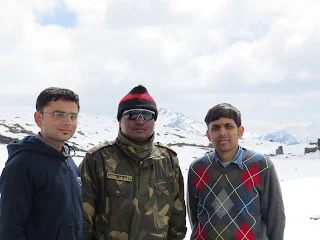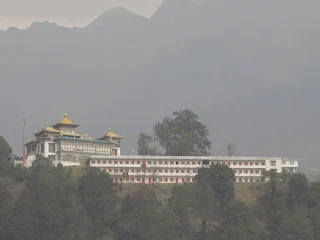Never forget where you came from that is what I learn all these years. It may not define you but gives a reference point to start. All of us must take an emotional journey to discover the roots, the cultural identity and constantly looking our own future course of action. I try much to write frankly, clearly and not with bitter heart. I am rooted in my local culture but I am not closed. I am aiming to be liberal while trying not be indifferent and disrespectful of the conservative surroundings. I'm not exactly as I appear as a stereotype. There is a warm loveable person inside. Beneath my cold exterior, once you break the ice, you can find a warm heart waiting for the embracement for new ideas.
Cultural entities and characteristics do require microfoundations. My grandfather was most liberal and chilled out person in my whole family. I learnt love of Nature, Urdu Couplets and Hindi Literature from my father. The zeal to read newspaper, fiction and nonfiction literature is a trait inherited by me from the parents. As I grew and traveled, I find some factors that were used to define my identity. There are few parameters that defined in both good and bad way. I can easily see mine upbringing and even behaviour belonging to certain reference groups. I marked out five attributes as per seen through lens of stereotype. Is that all there in me? Let us began to a cultural inquiry -
Religion Hindu - A grand religion whose majority exist in India. And yes they are tolerant in mind but highly illiberal in practice. Even the childhood environment around me was not religious, I was particularly attracted towards Rashtriya Swayamsevak Sangh (RSS) books. Usually traits of the majority can never be cause of retrospection unless forced and shaken under the crisis of identity. It was the time of Babri Masjid demolition that started my journey into Hinduism through mythological and history books. I slowly understand meaning of secular. I came to believe that human progress cannot be stopped and religion is an outdated idea. While going through agnostic and atheistic path, I tried to look Hinduism as an outsider. Because, only an outsider gets closer to certain difficult truths, and is therefore likely to see the contradictions and absurdities prevailing inside the system.
High Caste - I was born in caste of Bhumihar Brahmins. For starters, Who are Bhumihars ? As per Mark Tully Book, Bhumihars were brahmins until buddhist period and then we converted to Buddhism. In the fourth and fifth century, Buddhists started converting back to Hinduism. The Brahmin said that we could return to the fold but we couldn't be priests and take money for conducting religious ceremonies, so we became the only Brahmins who tilled the soil. They were not in the league of top notch Brahmins who performed Yagnas still practicing warrior and agriculture practices. My caste has not been subjected to any oppression in the past hence, I naturally belong to a privileged caste. Few may have heard of notorious and brutal
Ranvir Sena.
Social positions and roles can't fill pursuit for happiness, somehow they become instruments of discrimination. Surrender to the community pressure has inherent danger of the gradual loss of free will and independent thinking. Sometimes a taboo or resistance from family can trigger to begin the struggle to come to terms with this caste identity, reservation politics and surname. It took many years and still in process to learn about social justice in a casteist society.
English Medium Education - I was lucky to have education at primary level in Hindi Medium. Otherwise, the privilege of studying in English medium has side effects. The English books may give global values but often cut from the local realities. The collective ignorance only strengthened my conviction that the English-reading public needed to be exposed to their own mother tongue literature. Retrospecting now, it is impossible to read the book without considering the world whose values it reflects. I glanced English newspaper first time in class 9th. Currently, I am in refuge of English and isolation from Hindi is growing day by day.
Hindi speaking North Indian - At times it seems as though the cultural divide, the mental walls, are deeper and taller than any physical barrier underway. Among such issues, I feel not talk further but request you to read an intrinsic and comic stereotype of an UPite. A piece published in Tehelka as '
The Bhaiyya, the Bandit and the Bak-bak artist'.
Middle Class - To be ultra rich and feared in an unjust society is a disgrace. As per World Bank data of 2010, 96.3% live on less than $5 a day in India. [
Data Source] I was sure much above this majority belonging to a middle class upbringing with good opportunities of education and health facilities. Yes today middle class, which has renamed itself aam admi is enjoying the subsidies while benefits of government schemes are not reaching to the poor class. There is a bit of notion among elite and middle class that their success is purely due to merit. But their social success apparently has nothing to do with their social background. being from the best schools and meeting the best people at the best clubs. The whole middle class has been built on some sort of subsidy, corruption, tax relief/theft and assets such as land holdings. The denial of inherited benefits runs deep in many people stereotyping these qualification.
So what is the way to break these stereotypes ? Even today, our collective attitudes and prejudices towards remain a lot similar to what they were till a few decades back. There is a wave of modernism in India yet there is no sign of liberal mentality. The ultra-conservative mindset race, caste and class reappear when people in India actually engage with difference. Sociologist Shiv Visvanathan has a phrase for him:
the pragmatic conservative, who espouses zero-tolerance political morality and chalta hai expediency, who wants sex before marriage as well as a classified match. Despite of several years of coexistence, there is an unwritten rule of not mingling through marriage of one religion or caste. Getting people out of the reference groups is only a sure way to activate human relationships.
The broadening of my studies into history showed me that rhetoric and reality go their separate ways. I often find themselves in surroundings, where I don't fit in and even know how to deal with people having backward thinking. I always find the smarter thing to do is to acknowledge the drawbacks and actively seek for ways to address them. Equality and inclusiveness are two principles through which every wrong can be put to right.
I am born and brought up with this identity and education. Self education through books, cinema and meditation was more transformational experience in the overall context of mine intellectual and emotional development.
Whatever we understand and enjoy in human products instantly becomes ours, wherever they might have their origin. That is mantra of my life. The joy of flying in the sky is always more than nested life. That is why I change careers so frequently than others. So don't stereotype me.
Every rebel becomes a conformist, hence my real insecurity begins now.
Lottery of birth : Raoul Martinez at TEDxWhitechapel





